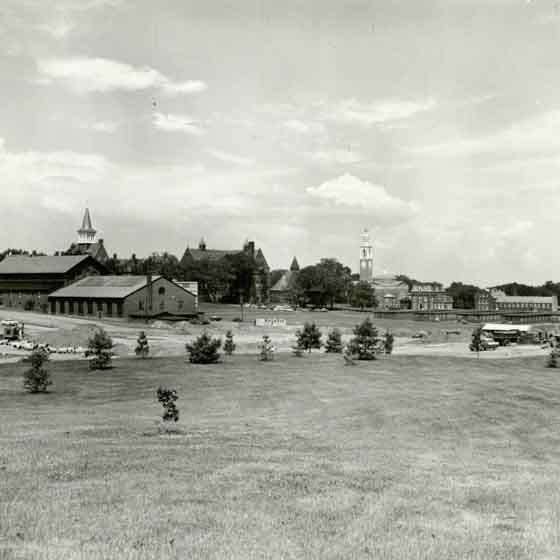Students watch as campus tranforms
A group of prospective UVM students and families led by a tour guide shuffled past the construction site of the new residence hall that will be open in August 2017.
This is just one of the buildings that will be included in the new housing model ResLife will be transitioning to starting next fall.
“Our goal for next year is 75 percent first-time, first-year students in programmed housing,” ResLife Director Rafael Rodriguez said. “The goal for the year after that is 100 percent.”
“Not everything and every single part is figured out; this is a multi-year process,” Rodriguez said.
Programming in residential halls already takes place in all on-campus living communities at UVM to some capacity, whether it be an event a residential adviser put on for their floor or a hall-wide theme, he said.
“Whether you live in Greenhouse or you just happen to live in Mason [Hall],” Rodriguez said, “the programmed pieces help enhance the student experience, and help them understand who they are and who we are as a community.”
Many universities in the U.S. use the programmed housing model because it has proven to have many benefits for students, he said.
“Students who live in residential themed or programmed housing experiences have absolutely better outcomes in terms of satisfaction with their residential experience, their level of engagement, level of retention and academic performance,” Rodriguez said.
Wesleyan University is another university encouraging students to participate in the programmed housing model.
“There are upwards of 30 program houses at Wesleyan,” Wesleyan senior Adam Mirkine said. “Considering the size of our school, which is around 3,000 with graduate students, I’d say that’s a considerable amount.”
Although programmed housing is optional at Wesleyan, it is quite popular among students due to the variety of options and the overall qualities of the living spaces, which tend to be more favorable than a classic dorm experience, Mirkine said.
“I think it would be fair to say that about one-third of the student population lives in program housing of some kind,” he said.
Though Mirkine said he “rarely hears criticism about the programmed housing system,” he said he does not believe that it is a path for everyone.
“While the program houses have a positive relationship with the greater campus community, I don’t think that a move to 100 percent program housing would be well received [at Wesleyan],” Mirkine said.
“As someone who has personally never lived in a program house, I think being forced to live in [one] may have made me feel forced into a particular social environment that I didn’t necessarily want to be in.”
Starting next year, first-year UVM students will have the opportunity to choose their top three choices from eight different themes.
“Our ultimate goal is that students will simply check off what topics or areas they’re interested in,” Rodriguez said. “Then, based on an algorithm or formula that we figure out, we can determine if we can guarantee folks any of their top choices.”
Depending on the student’s preferred theme, they will be placed in a residence hall dedicated to that theme, he said.
Each of the residence halls will have amenities and features related to the theme intended to will enhance the experience of living in that themed hall, he said.
For example, the outdoor-themed residence hall might have a space dedicated for students to store their skis, bikes and other outdoor equipment, Rodriguez said.
However, just because a student is in the “outdoor experience” themed residence hall does not mean they have to participate in a hike every weekend, he said.
“We know that engagement levels vary greatly,” Rodriguez said. “Every community and how students engage vary greatly.”
Some programs like the Wellness Environment, which is already expanding throughout campus, have certain expectations you are expected to adhere to.
“In WE, staying in the program has nothing to do with the level of your engagement,” Rodriguez said. “It has everything to do with what behaviors and whether or not you choose to meet the expectations around these certain behaviors; that’s what dictates whether you stay in the community.”
“We have this across campus already,” he said. “In any hall that you live in, if you engage in behavior that is detrimental to the community you can easily be removed; it already happens.”

“I think any initiative that helps create a strong sense of community on our campus is a good idea,” said Jay LaShombe, assistant director of UVM admissions. “I truly believe that the national attention, that specifically the incredible WE program is receiving, will help raise the profile of UVM.”
Prospective students and parents are also expressing interest in the new housing model.
“In my experience with speaking with parents, the consensus that I get is that they’re very excited about their student living in programmed housing,” LaShombe said. “I have often heard parents say that they wished these sorts of programs were available when they were students.”
Prospective students also share the excitement of the new programmed housing model.
Jenna Bordeau, an incoming student in f the class of 2021, applied early action with UVM as her top choice and has already made the decision to attend UVM in the fall.
“The [change in] dorm choices doesn’t hugely impact me because I’m hoping to be in the Honors College,” Bordeau said, “but I like the themed idea too. Dorm [styles] definitely play a factor in my college choice.”
Marnie Adelkopt, a high school senior from Westport, Connecticut, said the programmed housing initiative probably won’t affect her decision too much.
“It seems pretty cool and a good way to meet people your first year,” Adelkopt said.
Sophia Livecchi, another high school senior, has yet to decide on where she will be attending college, but said she would highly consider UVM if she is admitted.
The new housing model is something that would positively affect Livecchi’s decision of attending, even though she said housing is not something that would keep her from going to a school she loves, she said.
“It’s such a cool idea,” Livecchi said. “[It’s] something I would be super interested in, especially since I love the outdoors.”









